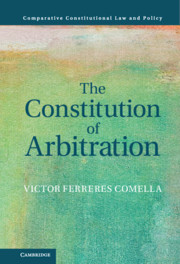Book contents
- The Constitution of Arbitration
- Comparative Constitutional Law and Policy
- The Constitution of Arbitration
- Copyright page
- Dedication
- Contents
- Acknowledgments
- Introduction
- Part I Arbitration and Private Law
- 1 The Liberal Case for Arbitration
- 2 Constitutionalizing the Right to Arbitration
- 3 Boundaries and Constraints
- 4 Arbitration and the Lawmaking Process
- 5 The Special Case of International Commercial Arbitration
- Part II Investment Treaty Arbitration
- Part III State-to-State Arbitration
- Index
5 - The Special Case of International Commercial Arbitration
from Part I - Arbitration and Private Law
Published online by Cambridge University Press: 11 March 2021
- The Constitution of Arbitration
- Comparative Constitutional Law and Policy
- The Constitution of Arbitration
- Copyright page
- Dedication
- Contents
- Acknowledgments
- Introduction
- Part I Arbitration and Private Law
- 1 The Liberal Case for Arbitration
- 2 Constitutionalizing the Right to Arbitration
- 3 Boundaries and Constraints
- 4 Arbitration and the Lawmaking Process
- 5 The Special Case of International Commercial Arbitration
- Part II Investment Treaty Arbitration
- Part III State-to-State Arbitration
- Index
Summary
Arbitration is widely used in the international commercial arena. When contracting parties come from different countries, arbitration is often selected to adjust contractual disputes. One of the reasons for this preference has to do with the adoption in 1958 of the New York Convention, which effectively secures the enforcement of arbitral agreements and awards. Another reason is that arbitration enables the parties to create a neutral forum, detached from local courts, for transborder controversies to get adjudicated in an impartial manner. The argument that courts may be biased against ousiders raises interesting issues about the best ways to guarantee impartiality in a world where nationality seems to matter. International commercial arbitration also poses questions concerning the role of arbitrators in the lawmaking process. Are arbitrators generating a body of transnational law that is autonomous from democratically-enacted national legislation?
- Type
- Chapter
- Information
- The Constitution of Arbitration , pp. 90 - 110Publisher: Cambridge University PressPrint publication year: 2021

